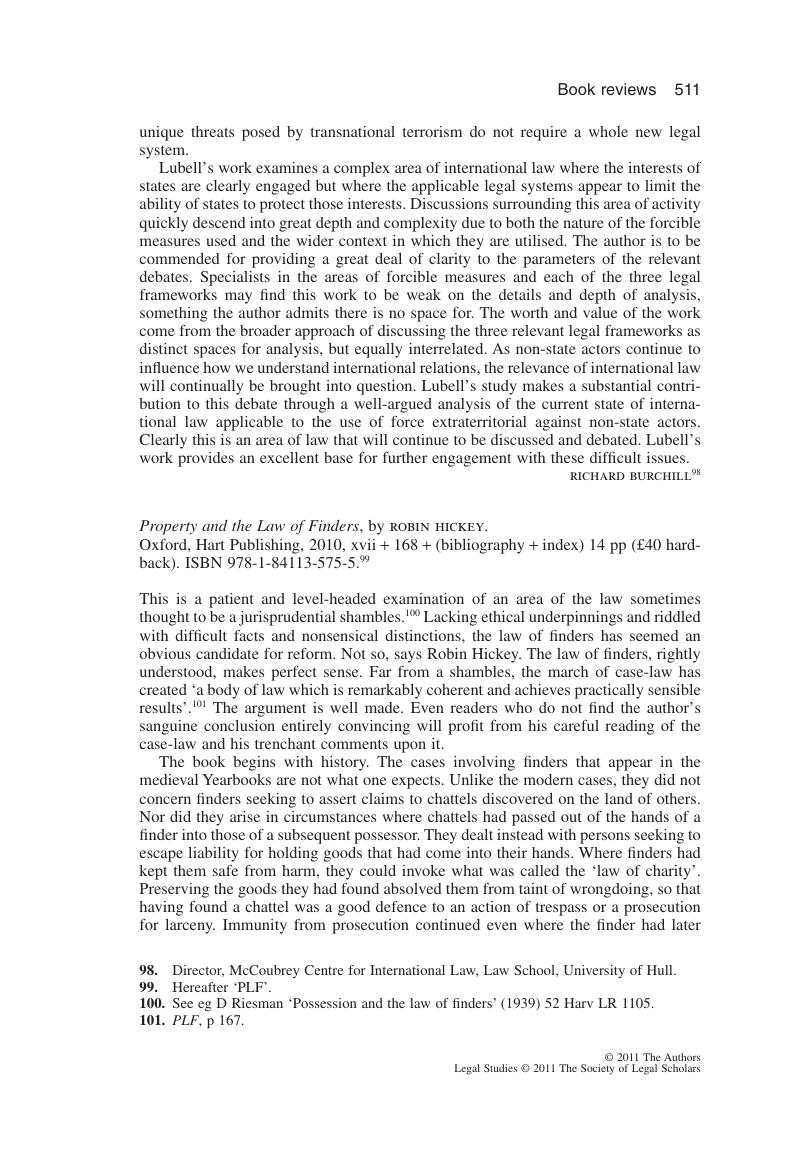No CrossRef data available.
Published online by Cambridge University Press: 02 January 2018

99 Hereafter ‘PLF’.
100 See eg D Riesman ‘Possession and the law of finders’ (1939) 52 Harv LR 1105.
101 PLF, p 167.
102 SFC Milsom Historical Foundations of the Common Law (London: Butterworths, 2nd edn, 1981) pp 234–235.
103 (1722) 1 Stra 505.
104 PLF, p 27.
105 (1851) 15 Jur 1079.
106 (1886) LR 33 Ch D 562.
107 F Pollock and RS Wright Essay on Possession in the Common Law (Oxford: Oxford University Press, 1888).
108 OW Holmes in MD Howe (ed) The Common Law (Cambridge, MA: Harvard UP, 1963) pp 175–178.
109 PLF, p 145.
110 For instance, Grafstein v Holme[1958] OR 296, 12 DLR 2d 727 (the decision endorsed a presumption in favour of the possession of the occupant of a building, adding at 738, that ‘as it has been remarked, “There is no magic in four walls”, and the presumption may be rebutted, of course’).
111 PLF, p 109.
112 PLF, pp 61–62.
113 RA Brown Law of Personal Property (Chicago IL: Callaghan, 3rd edn, 1975) pp 24–25 (‘[A]pplication of the possession concept has probably resulted more in confusion than in clarity). See also AES Tay ‘Possession and the modern law of finding’ (1964) 4 Sydney LR 383.
114 [1948] 2 KB 142; [1948] All ER 860.
115 ER Cohen ‘The finders cases revisited’ (1970) 48 Texas LR 1001–02.
116 PLF, pp 56–63. See McAvoy v Medina (1866) 93 Mass (11 Allen) 548. This criticism, though not without merit, gives too one-sided a picture of the dominance of this distinction in American case-law. It should take account of cases like Barker v Bates (1832) 30 Mass 255; Silcott v Louisville Trust Co (1924) 265 SW 612 (Ky); Pyle v Springfield Marine Bank (1946) 70 NE 2d 257 (Ill App); State v Green (1984) 456 So 2d 1309 (Fla).
117 PLF, p 161.
118 To offer a reward to finders for turning over lost property to the owners would, for example, create more mischief than leaving things as they are.
119 Civic Government (Scotland) Act 1982, c 45, pt VI (requiring the finder to ‘without unreasonable delay deliver the property or report the fact that he has taken possession of it to a constable’ or other person having an interest in the chattel).
120 Eg Iowa Code § 556F.6–556F.12 (2008), requiring finders of ‘any lost goods, money, bank notes, or other things of any description whatever, of the value of five dollars and over’ to take them to the county sheriff for purposes of advertisement for ‘the owner thereof’. Title vests in the finder after passage of 12 months if no claim is made. The statute makes no provision for sorting out the rights between the finder and the owner of the locus in quo, however.